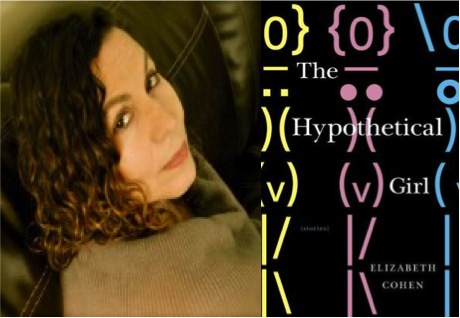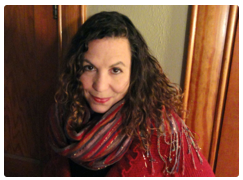
Guest contributor: Katherine Heiny
Table for Two: An Interview with Elizabeth Cohen
categories: Cocktail Hour / Table For Two: Interviews
6 comments
I read The Hypothetical Girl because my friend Elizabeth Cohen wrote it. That’s what you do when a friend writes a book, you buy it and read – it’s like if a friend opened a barbershop, you’d go and get your hair cut. But I was so knocked out by the collection that I wound up emailing Elizabeth after nearly every story, because each is more wonderful than the one before. All the stories are about looking for relationships online, and finding heartache, surprise, betrayal, and – just maybe – love. Elizabeth’s writing is funny, wise, insightful, and memorable. All the things you want fiction to be that it hardly ever is. In the end, I had to ask her more questions, and she was kind enough to answer.
Katherine Heiny: Did you set out to write a collection about Internet dating or did you realize as you went along that that’s where the book was headed?
Elizabeth Cohen: The book crept up on me. I was very busy doing two things: 1) avoiding other work I was supposed to be doing and 2) processing the experience of looking for love in mid life. The alchemy of these two things produced this cascade of stories. I did not think of them as good or as moving toward a book or anything really. I am actually a poet and a journalist. I am a nonfiction person, or at least I have been. Other than poetry, I wrote a lot of essays and articles, a memoir and a biography.
These stories came along and knocked on the door of me and I just answered. I just wrote them, sort of urgently, to distract myself and because life seemed so tragically funny to me, and I needed to do something with that stuff. I would write them and then call my friend Ruth and read them to her or my cousin Stuey, who has cancer and needed some serious cheering.
 KH: Are any of the online dating experiences in the book based on someone you know, or events in your own life? Or would you rather not answer that?
KH: Are any of the online dating experiences in the book based on someone you know, or events in your own life? Or would you rather not answer that?
EC: Some are based upon an amalgam of people I read about online or actually met, others are based on nobody at all, just scenarios that seemed to be bubbling up in my head at that time. Only one story is a more or less true story, mildly changed to protect the innocent – or guilty – I suppose. I will not say which one.
KH: Were there any great or horrible online dating experiences people told that you couldn’t fit into a story?
EC: Yes. People began telling me all their horror stories once it got out I was writing these. Some were so horrific I thought in fiction they would be unbelievable. Like one my friend told me about how she met this guy and they were making out on her couch when a gun tumbled out of his pocket – he was a cop! I find that so crazy and oddly funny, but I just couldn’t DO anything with it.
Some were just silly. But not silly enough, if you know what I mean. Some were funny but didn’t seem malleable. Some were so sad. Too sad to write.
KH: The protagonist in “The Opposite of Love” is a writer and says her book “practically wrote itself.” Was that your experience with The Hypothetical Girl?
EC: Yep. Her experience mirrors my own. One or two a stories a month for a couple years. There are a lot more we weeded out. The book had to come out, for some reason. I just turned on the computer for it.
KH: Which story from the collection is your favorite?
I love them all in different ways, like kids. You aren’t allowed to favorite. Right? There are some I love but do not work well read aloud, like “Animal Dancing.” Others I really enjoy reading to people, like “Death by Free Verse” and “People Who Live Far, Far Away” because they have a lot of humor in them. “The Opposite of Love” is about a woman who has breast cancer and I am always afraid that it might offend or upset people who really have cancer. “Boat Man” has a character loosely based upon my own father so I love it for that, but I cannot read it without choking up.
KH: Which story was easiest to write? Which the hardest?
EC: The easiest story to write was “Love, Really.” I wrote it in the second person, which I usually hate, but for some reason worked well, and it has a refrain…”This is the part where,” and that literary strategy gave me an instant shape to use. Some people might find it repetitive but I like it like that.
The hardest story to write was “Love Quiz.” I wrote it about a woman taking a love quiz and also made it into a love quiz, the story itself. It is highly experimental and kind of risky, in that regard. And I knew there would be some people who just didn’t like it for that reason. The reader has three different endings to choose from and one of the endings is quite horrible and I fear some might find it gratuitously so. I love that story and also hate it. Writing it was like doing math. And I do not like math.
KH: This will make your book sound like a horror movie, but you do very interesting things with body parts — the man who thinks that since he own his vocal cords, he has the right to lie; the woman who realizes her heart, the actual organ, cannot possibly care about her lover’s betrayal. Is that indicative of the way you see the world?
EC: Hmmm. Do I see the world in terms of body parts? I don’t think so. But I do have a very poet-y mind, which really drives some people nuts. I see everything in flowery prosaic terms and often in terms of story. I am addicted to metaphor/simile. I am addicted to describing. I can go on and on. People with ADD are made very uncomfortable by me.
KH: In “Heart Food,” a woman literally removes her own heart and lets it look online for love. Do you feel that that’s what Internet dating is, in a way: putting your poor defenseless heart out there? More than what your characters call “real dating”
EC: Yep. That is exactly what I think. I really made myself laugh writing about this woman who at one point has an argument with her heart. And the heart becomes really pushy and bombastic. It becomes a little terrorist.
Internet dating is like shopping online, only for people. You put your stuff out into the ether and hope someone will select it. You choose someone else’s raw little heart. Real dating is nothing like that. You meet an actual person, there is no moment when your guts are on display, naked.
KH: A lot of the characters in your stories check their emails compulsively. Do you feel that’s better or worse (or just different) from the days when people only waited for the phone to ring?
EC: Worse. Way worse. Find a typical 14-year-old girl and just watch her for an hour. It is pretty sick.
KH: I loved how much you obviously loved all your characters. Would you tell them to steer clear of the Internet, or are you as hopeful as they are that it will work out?
EC: I do love them. I also feel sad for them. This is a book about people in midlife who are lonely. I want to give them hugs and take them to the movies and tell them not to fret so much. I would let them get the bad fake butter stuff on their popcorn and drink non diet drinks and have candy. They need a break, these characters.
KH: I know that you’re a teacher and editor and mother in addition to be a writer – what did you have to give up in order to find time to write?
EC: SINGLE mother. Don’t forget that word. Single. It is kind of important. And yes, I gave up stuff. I made choices. Here is a list of a few things that come to mind:
1. I gave up the class trip to NYC when my daughter was in 5th grade.
2. I gave up vacations.
3. I gave up most weekends.
4. I gave up sleep.
5. I gave up television.
6. I gave up relationships. (For several years anyway, I wrote about them, instead of having one)
7. I gave up Thanksgiving one year.
8. I gave up hanging out with the girls.
9. I gave up other writing projects for a time. But they were not coming then anyway, so I guess that doesn’t count.
10. I gave up poetry. All my writing ideas went flying into this book. I turned some nice little poems away at the door. I stole from them.
KH: If you had to do it all over again, would you change anything in your latest book?
EC: Hmmm… I might put some of the stories we took out, back in. But maybe not. I really like it. It still gives me the giggles to read some of the stories. And some of them still get me. They sort of kick my ass to read. I put my whole self into them and for that reason I do not feel much regret. Regret is for relationships, not books, and maybe not even for relationships.



EC, are you calling me a 14 year old girl?!! This book sounds great, funny and moving – and who couldn’t relate to the mating dance called dating!
No, I would NEVER call you an actual 14-year-old girl, but my stories might bring out the inner 14-year-old-girl in you. Becuase we all have one lurking. Somewhere. Hope you like my stories!
Your list of what you gave up to be a SINGLE mom is humorous, but look at all you got, look how rich you are! (make that list and compare!) This book sounds fun, you talked me into it. But do these pants make me look fat? 🙂
No, they suit you. In black of course.
I read between the lines here and heard, black is slimming. Thanks for the tip!
Nah. Black is the new black. That’s all.